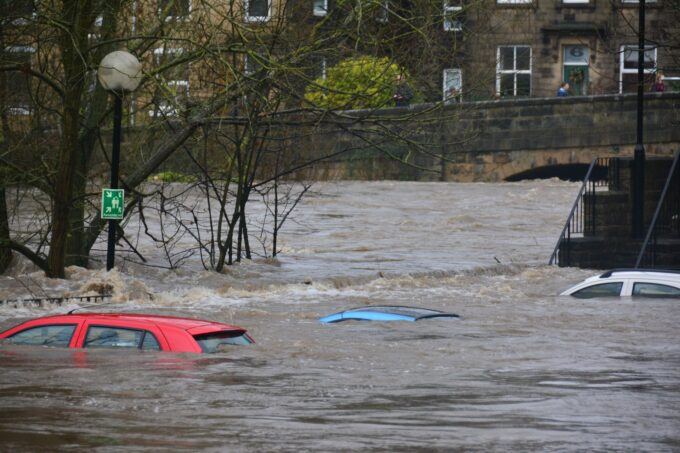
Photo by Chris Gallagher
American political commentators wasted no time falsely equating the creation of a loss and damage fund at the United Nations Climate Change Conference (COP27) with “climate reparations” and fringe globalist conspiracies. With every news story about the fund presenting as solely a moral issue, I’m hardly surprised to see that reaction.
“Loss and damage” refers to unavoidable suffering caused by climate change — that which countries cannot mitigate or prepare for. Recent examples include the disappearance of land from Pacific Island nations, a historic drought in the Horn of Africa displacing 1.5 million people as they searched for food and water, and this year’s floods in Pakistan, which submerged a third of the country, killed more than 1,700 people, and caused $30 billion in economic damage. Developing countries came to COP27 insisting on the creation of a fund to address loss and damage, noting that they did little to cause climate change and don’t have the money to withstand these damages themselves.
But the fund benefits the economic and national security of the United States too. We wouldn’t have agreed to it otherwise.
Climate activists, journalists, and far-left politicians keep communicating loss and damage as a moral issue: Wealthy countries caused climate change, so they should pay to clean it up. This wrongly suggests a loss and damage fund is a win-lose proposition. With that framing, it’s no wonder news media in the United States, United Kingdom, and Australia have already misinterpreted loss and damage as a globalist conspiracy.
When the argument is purely a moral one, Americans aren’t wrong when they respond cynically, noting we have too many issues here at home to be anyone else’s piggy bank. But from the American perspective, what happens if a developing country experiences an unavoidable climate disaster and can’t bear the cost? Economically, countries could go bankrupt or fail to repay international loans, meaning Americans would no longer be able to export to these countries which could cost jobs back home. Disasters could also disrupt global supply chains, further spiking inflation.
Natural disasters have also been an opportunity for terrorist groups to try to build support. When Pakistan struggled to fund recovery efforts from catastrophic flooding in 2010, militant Islamic terrorist groups such as Jamaat-ud-Dawa set up small food distribution sites in flooded areas and attempted to appeal to displaced people. Recruitment opportunities for militants certainly threaten U.S. security.
Americans could also be hit with public health impacts. Outbreaks of infectious diseases such as cholera, measles, and malaria are on the rise in drought-stricken East Africa and flooded Pakistan as these disasters deteriorate sanitation and disrupt vaccination efforts. These diseases are obviously rare in the U.S., but the coronavirus made clear that an uncontrolled disease outbreak on the other side of the world can quickly thrust our country into a crisis.
It’s no wonder, then, that this year the United States has already provided $97 million in aid to Pakistan in response to flooding and over $870 million in aid to Somalia in response to the drought. These aren’t handouts, they’re investments in America’s economic and national security.
In addition, it’s worth noting despite many headlines suggesting otherwise, loss and damage is unequivocally NOT “climate reparations.” The entire world signed off on the definition of loss and damage on the condition that it not involve liability or compensation at COP21 in 2015, and again in drafting the COP27 agenda.
The European Union and United States delegates have also made clear they will not take an unfair deal for their citizens. Their position remains that funding must only go to the most vulnerable countries and rapidly growing economies such as China and Saudi Arabia must contribute too. Seeing as the United States already offers some foreign aid during disasters, the fund would actually serve as an accountability mechanism to ensure we’re not the only country helping.
With those concerns made clear, only a few big questions remain: How much does the U.S. need to contribute to satisfy our allies and protect our economic and national security interests without becoming the world’s ATM? And where do we get the money?
Beyond just federal budget spending, some have proposed putting a windfall tax on fossil fuel companies’ enormous profits. That makes some sense — the entire cost of loss and damage for developing countries is a mere tenth of the $4 trillion in net income that oil and natural gas producers will gain in 2022. But there could also exist options without any climate taxes. The government could use market incentives to encourage private companies to contribute directly to the fund.
Ultimately, if Americans can get on the same page about the benefits of contributing to a loss and damage fund, we can find a fair and bipartisan mechanism to raise the money. A purely moral discussion, on the other hand, only sparks disagreement.
When we talk about the loss and damage fund, we should acknowledge the perks for all countries involved and avoid inaccurate terms like “climate reparations.” If the fund remains grounded in reality, fairness, and accountability, it will actually be a win for the people of the United States.